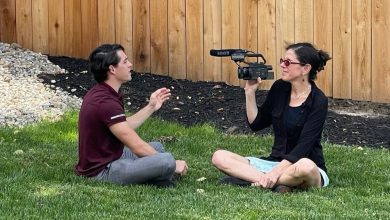What Does It Mean to Be a Witness?

WITNESS: Stories, by Jamel Brinkley
The National Book Award finalist Jamel Brinkley’s sophomore story collection, “Witness,” opens with an epigraph from James Baldwin, describing how thin the line is between a witness and an actor: “Nevertheless,” Baldwin concludes, “the line is real.” But is it? Over the course of 10 splendidly thought-provoking stories — set in Brooklyn and featuring animal rescue volunteers, florists, ghosts, UPS workers and a host of other characters — Brinkley shatters Baldwin’s thesis, masterfully demonstrating that witness and actor are one and the same.
The act of witnessing is often rooted in physical sight, so an emphasis on what the eye perceives only makes sense. Throughout the collection, characters see and are seen, experiencing a kaleidoscopic range of emotions in response to being observed. One young man, in “The Let-Out” — a story about a rendezvous with a colorfully dressed and alluring older woman at a museum — remarks: “Everyone was looking at us as we left the party, which was a new experience for me. I had never been that kind of person.”This echoes an earlier scene in which he muses on the thrill of being picked out of the background and the life-affirming experience of being noticed by someone else. However, in “Bystander” — centered on a family grappling with illness and tension — a daughter asks her mother, “Why are you staring at me?” as if she has no right; as if it’s the deepest invasion.
But Brinkley pierces the superficial and obvious — that what meets the eye is all there is to see — by displaying a more nuanced portrait of how we perceive and are perceived. Witnessing is a corporeal, sensory act, yes, but it also expands into the spiritual. “I can see your true nature now,” a woman tells her brother in “Witness,” a particularly heart-shattering story about a jobless grad student living in a cramped apartment with his ill sister and her new husband.
Stylistically, the beginnings of these stories are akin to being thrust into a moving current — Brinkley doesn’t waste time on unnecessary setup or trivial fluff. His smooth prose rips and slips down the page, getting right to the point. “Helena Porter kept her room the way she said all bedrooms should be kept,” one story opens. “Like a lady’s armpit: neat, bare and inodorous, not accessible to the eyes of enemies or strangers.”
This direct approach, paired with Brinkley’s tight, powerful sentences, creates an experience that is exhilarating and impactful, especially when a sudden revelation brings the intensity to a record-scratching stop, as in “The Happiest House on Union Street,” when you learn why an 8-year-old character is hospitalized. With the disclosure you realize that you, too, are a witness; it is impossible to divorce the spectator from the spectacle, and participating in any capacity often comes at a cost.
Still, while being a witness can be perilous, this collection demonstrates that the absence of a witness is even more dangerous. To lack witnesses throws into question just who, exactly, gets to write history. This is most crystallized in “Comfort,” which focuses on a young woman trying to move through life after the death of her brother four years prior, at the hands of a police officer who was found not guilty. “How is it,” the woman asks, “that a man can shoot himself in the head with his hands cuffed behind his back in a patrol car?” The story asks whose testimony is Swiss-cheesed with bullet holes and whose is gilded in truth.
Brinkley is a writer whose versatility knows no boundaries. He can make you laugh, cry, contemplate life’s deepest questions, remember what it was like to be a child, and feel the warmth, or chill, of your own family history. Tapping into the sticky stuff of humanity, each story is a gift of the highest quality, reminding us that we are all both in the audience and on life’s stage, even if we don’t know it. Forever the witness and the witnessed.
Mateo Askaripour’s debut novel is “Black Buck.” His second novel, “This Great Hemisphere,” will be published in 2024.
WITNESS: Stories | By Jamel Brinkley | 226 pp. | Farrar, Straus & Giroux | $27





